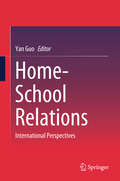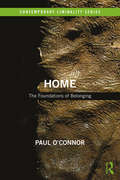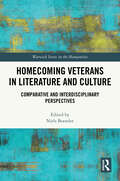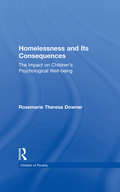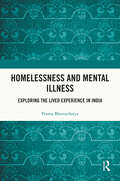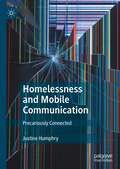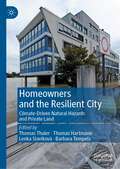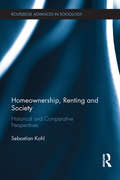- Table View
- List View
Home, Family and Community (Routledge Library Editions: Family)
by Kathleen HeasmanOriginally published in 1978, this book was written in response to the growing need for resource material for Home Economics courses in which the sociological content was becoming increasingly important. It was particularly valuable for A level teachers and students, and it provided a clear and useful introduction to the subject for students following courses in Home Economics, Social Studies and General Studies in colleges of education and polytechnics at the time. It brings together material from a number of disciplines – sociology, economics, psychology – on the home, the family and the community, which had not previously been presented in the context of a single study. The select bibliography suggests further reading for both teachers and students, graded according to difficulty. Today it can read and enjoyed in its historical context.
Home, Materiality, Memory and Belonging: Keeping Culture
by Rachel HurdleyAssembling Mass Observation Archive material with historiographies of family, house and nation from ancient-Greece to present-day Europe, China and America, this book contributes to current debates on identity, belonging, memory and material culture by exploring how power works in the small spaces of home.
Home- and Community-Based Services for Older Adults: Aging in Context
by Keith Anderson Holly Dabelko-Schoeny Noelle FieldsAs older adults and their families opt out of nursing homes, a range of home and community-based services (HCBS) have risen up to provide care. HCBS span platforms and approaches, from home health care to assisted living to community-based hospice to adult day services. These models are, for most, preferable to nursing homes and allow older adults to “age in place”—live longer in their own homes and communities. Home- and Community-Based Services for Older Adults examines the existing and emerging models of HCBS, including the history, theory, research, policy, and practices across care settings. Emphasizing the multidisciplinary and interprofessional practice approaches used to deliver care, this book is an essential learning tool for students interested in medicine, nursing, social work, allied health professions, case management, health care administration, and gerontology. As the population of older adults grows, the authors ask, how can we best meet the needs of older adults and their families in the most effective, cost-conscious way while honoring their care choices?
Home-Grown Hate: Gender and Organized Racism (Perspectives on Gender)
by Abby L. FerberThe top names in the field come together in this collection with original essays that explore the link between gender and racism in a variety of racial and white supremacy organizations, including white separatists, the Christian right, the militia/patriot movements, skinheads, and more.
Home-School Relations: International Perspectives
by Yan GuoThis book examines new directions in home-school relations from an international perspective. Unlike other current literature that concentrates on traditional models of family-school partnerships in Western countries, it focuses on the contributions of immigrant and minority parents, especially those in Asia and South America. This book brings together international scholars who explore home-school relations in Australia, Brazil, Canada, China, Hong Kong, South Korea, Mongolia, Sweden and the United States.
Home: The Foundations Of Belonging (Contemporary Liminality)
by Paul O'ConnorQuestions of home and belonging have never been more topical. Populist politicians in both Europe and America play on anxieties over globalisation by promising to reconstitute the national home, through cutting immigration and ‘taking back control’. Increasing numbers of young people are unable to afford home-ownership, a trend with implications for the future shape of families and communities. The dominant conceptualisations of home in the twentieth century – the nation-state and the suburban nuclear household – are in crisis, yet they continue to shape our personal and political aspirations. Home: The Foundations of Belonging puts these issues into context by drawing on a range of disciplines to offer a deep anthropological and historical perspective on home. Beginning with a vision of modernity as characterised by both spiralling liminality and an ongoing quest for belonging, it plumbs the archaic roots of Western civilisation and assembles a wide body of comparative anthropological evidence to illuminate the foundations of a sense of home. Home is theorised as a stable centre around which we organise both everyday routines and perspectives on reality, bringing order to a chaotic world and overcoming liminality. Constituted by a set of ongoing processes which concentrate and embody meaning in intimate relationships, everyday rituals and familiar places, a shared home becomes the foundation for community and society. The Foundations of Belonging thus elevates ‘home’ to the position of a foundational sociological and anthropological concept at a moment when the crisis of globalisation has opened the way to a revaluation of the local.
Homecoming Veterans in Literature and Culture: Comparative and Interdisciplinary Perspectives (Warwick Studies in the Humanities)
by Niels BoenderFrom Homer’s Odyssey itself, the return of the veteran to his or her home has been a central trope of the literary canon. Huge bureaucracies and a panoply of global organisations are deeply concerned with facilitating a painless return to stable homes. This book presents ‘homecoming’ as an analytical lens to better understand veterans’ return and reintegration after conflict. Home is held to be multidimensional, a concept encapsulating the physical and the social, particularly disrupted by experiences of violence. Homecoming is, therefore, not a mere moment but a process that can unfold over years and decades as old and new bonds of familiarity are forged. Struggles over the home and homecoming are, moreover, endlessly political, bound up in questions of identity and the nation. Looking across times, places, and disciplines, the collection centres both historical and representational approaches to veterancy.
Homegrown: How the Red Sox Built a Champion from the Ground Up
by Alex Speier“Alex Speier spins a compelling narrative about how great scouting and player development created a perennial contender in baseball’s toughest division, without losing sight of the people at the heart of his story.” — Keith LawThe captivating inside story of the historic 2018 Boston Red Sox, as told through the assembly and ascendancy of their talented young core—the culmination of nearly a decade of reporting from one of the most respected baseball writers in the country.The 2018 season was a coronation for the Boston Red Sox. The best team in Major League Baseball—indeed, one of the best teams ever—the Sox won 108 regular season games and then romped through the postseason, going 11-3 against the three next-strongest teams baseball had to offer.As Boston Globe baseball reporter Alex Speier reveals, the Sox’ success wasn’t a fluke—nor was it guaranteed. It was the result of careful, patient planning and shrewd decision-making that allowed Boston to develop a golden generation of prospects—and then build upon that talented core to assemble a juggernaut. Speier has covered the key players—Mookie Betts, Andrew Benintendi, Xander Bogaerts, Rafael Devers, Jackie Bradley Jr., and many others—since the beginning of their professional careers, as they rose through the minor leagues and ultimately became the heart of this historic championship squad. Drawing upon hundreds of interviews and years of reporting, Homegrown is the definitive look at the construction of an extraordinary team.It is a story that offers startling insights for baseball fans of any team, and anyone looking for the secret to building a successful organization. Why do many highly touted prospects fail, while others rise out of obscurity to become transcendent? How can franchises help their young talent, in whom they’ve often invested tens of millions of dollars, reach their full potential? And how can management balance long-term aims with the constant pressure to win now?Part insider’s account of one of the greatest baseball teams ever, part meditation on how to build a winner, Homegrown offers an illuminating look into how the best of the best are built.
Homeland Insecurity: A Hip Hop Missiology for the Post–Civil Rights Context
by Daniel White HodgeNorth American domestic missions are now situated in a complex landscape of changing faith, ethnic diversity, and racial unrest. But most missiological approaches continue under colonialist assumptions and lack the cultural competency to navigate new realities. Missiologist Daniel White Hodge explores the contours of post–civil rights contexts and focuses on Hip Hop theology as a framework for radical engagement of emerging adult populations. He critiques the impaired missiology of imperialist and white supremacist approaches to modern, urban short-term missions. With keen cultural exegesis of the wild, he explores the contours of a more contextualized Hip Hop Jesus. Reexamining the importance of race and ethnicity in mission, Hodge offers theological space for protest and social disruption and suggests conceptual models for domestic missions within a growing multiethnic demographic. Grounded in Hip Hop studies and youth ministry, Hodge constructs a hybridity of lived missiology where dissent and disruption open new possibilities for Christian faith in the twenty-first century.
Homeless Lives in American Cities: Interrogating Myth and Locating Community
by Philip WebbHomeless Lives in American Cities explores how the American discourse on homelessness arose from Victorian social and political anxieties about the impacts of immigration and urbanization on the middle class family. It demonstrates how contemporary social work and policy emerge from Victorian cultural attitudes.
Homeless Youth of Pakistan: Survival Sex and HIV Risk (SpringerBriefs in Public Health)
by Muhammad Naveed NoorWhile homeless young people (HYP) are typically perceived as irresponsible and morally suspect individuals who lack essential social skills to navigate their lives, this book offers an alternative and more positive perspective. It demonstrates that HYP improvise with resources available on the streets to improve their social and financial status, although they experience significant social structural constraints. This ground-breaking text provides an analysis of social processes that contribute to young people’s homelessness, their engagement in sex work, their establishment of intimate partnerships, and sexual practices which may increase their risk of HIV and other sexually transmitted infections (STIs). The book demonstrates how the ongoing social and financial instability and insecurity neutralises HYP’s knowledge of HIV/STIs, and how financial considerations, fear of violence by clients, and social obligations in intimate partnerships contribute to their sexual risk-taking. The author argues that the conventional approach of promoting health through raising awareness regarding HIV/STI prevention may continue to bring less than promising outcomes unless we focus on how structural and contextual conditions operate in the backdrop and produce conditions less conducive for young people. Included in the coverage: factors that contribute to youth homelessnessfactors that shape sexual practice a Bourdieusian analysis of youth homelessness and sexual risk-takinga health promotion approach that can potentially reduce youth homelessness and their risk of HIV/STIs Homeless Youth of Pakistan: Survival Sex and HIV Risk will attract undergraduate and postgraduate students, and researchers interested in exploring issues such as youth homelessness, sexual risk-taking, and HIV/STIs.
Homelessness Is a Housing Problem: How Structural Factors Explain U.S. Patterns
by Gregg Colburn Clayton Page AldernIn Homelessness Is a Housing Problem, Gregg Colburn and Clayton Page Aldern seek to explain the substantial regional variation in rates of homelessness in cities across the United States. In a departure from many analytical approaches, Colburn and Aldern shift their focus from the individual experiencing homelessness to the metropolitan area. Using accessible statistical analysis, they test a range of conventional beliefs about what drives the prevalence of homelessness in a given city—including mental illness, drug use, poverty, weather, generosity of public assistance, and low-income mobility—and find that none explain the regional variation observed across the country. Instead, housing market conditions, such as the cost and availability of rental housing, offer a far more convincing account. With rigor and clarity, Homelessness Is a Housing Problem explores U.S. cities' diverse experiences with housing precarity and offers policy solutions for unique regional contexts.
Homelessness and Housing Advocacy: The Role of Red-Tape Warriors
by Curtis SmithThrough compelling ethnography, Homelessness and Housing Advocacy: The Role of Red-Tape Warriors reveals the creative and ambitious methods that social service providers use to house their clients despite the conflictual conditions posed by the policies and institutions that govern the housing process. Combining in-depth interviews, extensive fieldwork, and the author’s own professional experience, this book considers the perspective of social service providers who work with people experiencing homelessness and chronicles the steps they take to navigate the housing process. With assertive methods of worker-client advocacy at the center of its focus, this book beckons attention to the many variables that affect professional attempts to house homeless populations. It conveys the challenges that social service providers encounter while fitting their clients into the criteria for housing eligibility, the opposition they receive, and the innovative approaches they ultimately take to optimize housing placements for their clients who are, or were formerly, experiencing homelessness. Weaving as it does between issues of poverty, social inequality, and social policy, Homelessness and Housing Advocacy will appeal to courses in social work, sociology, and public policy and fill a void for early-career professionals in housing and community services.
Homelessness and Its Consequences: The Impact on Children's Psychological Well-being (Children of Poverty)
by Rosemarie T. DownerThis book explores in detail the concept of homelessness by examining the dynamics of shelter living and the financial costs in comparison to the psychological costs to the children and the family. A comparison is made with housed low-income families to highlight the fact that homelessness, outside of poverty, does play a key role in the negative outcomes of homeless children and families. Psychological well-being is defined with behavioral outcomes and self-concept while family functioning is defined with parenting dimensions, family environment and social supports. Strong recommendations are made for program implementations to provide a comprehensive response to the needs of homeless families with children.(Ph.D. dissertation, University of Maryland 1997; revised with new preface, bibliography, and index)
Homelessness and Mental Illness: Exploring the Lived Experience in India
by Prama BhattacharyaThis book explores the trajectories of social suffering, exclusion, and victimization of homeless persons with mental illness in India. It uses a Critical Ethnographic approach to study their lived experiences associated with downward mobilization and the challenges in the process of recovery and empowerment. Using theoretical and methodological implications, the volume highlights the experiences of this marginalized population through their voices instead of relying on epidemiological data only. It presents stories that show how such persons celebrate their abilities to tolerate all forms of ostracization and endure the sufferings with fortitude. The book discusses how ‘hope’, as a part of their experience, catalyzes the process of recovery and empowerment and helps them develop meaningful social ties to access valued social resources. It further brings to light the difficulties experienced by service providers in providing service due to a lack of resources and support at a systemic level and awareness about mental illness among various stakeholders. This book will be of interest to students, teachers, and researchers of social psychology, clinical psychology, community psychology and sociology. It will also be helpful for academicians, policymakers, social workers, mental health practitioners, and NGO personnel.
Homelessness and Mobile Communication: Precariously Connected
by Justine HumphryThis book examines how mobile phones and the internet have become a vital part of the everyday lives of people experiencing homelessness. But the access mobile phones provide is costly, insecure and limited, producing an experience of being precariously connected. Drawing on findings of research conducted with over one hundred young people, families and adults experiencing homelessness in Australia and the United States, this book analyses homelessness as a mediated condition and explores the underpinning processes that shape digital disparities. It contributes to scholarship on mobile communication and inequality, highlighting the digital patterns, issues and difficulties of a group disproportionately affected by service reform and developments in digital citizenship, smart cities and algorithmic governance.
Homelessness and Social Policy
by Roger Burrows Nicholas Pleace Deborah QuilgarsThe problem of homelessness is deeply emblematic of the sort of society Britain has become. What other social phenomena could better epitomise the end of modernity than our seeming inability to adequately respond to the most basic needs - shelter, warmth, food - of substantial numbers of our 'citizens'? Homelessness and Social Policy offers a dispassionate analysis of the problem of homelessness and the policy responses it has so far invoked. By reviewing theoretical and legal conceptualisations of homelessness and presenting extensive statistical analyses, this book considers the impact of the experience of homelessness and the policy responses. Homelessness and Social Policy will prove to be invaluable to students of social and public policy, health studies, housing studies and sociology.
Homelessness in America: Perspectives, Characterizations, and Considerations for Occupational Therapy
by Kathleen Swenso Miller Georgiana L Herzberg Sharon A RayLearn how to better address the needs of the homelessThe causes of homelessness are complex and varied. Homelessness in America provides an overview of the state of research on the homeless population from an occupation and societal participation perspective. This important resource explores the systems of care in which homeless services are organized, the tailoring of services to meet the needs of diverse types of homeless, the newest trends in services, and crucial funding sources. Research is comprehensively examined from an occupation-based perspective, including studies on specific issues pertaining to various homeless populations. This in-depth discussion provides a vital understanding of homelessness using a client-centered and strengths-based approach in occupational therapy. Much of the research and writings of occupational therapists who work with homeless populations has been scattered throughout various diverse publications. Homelessness in America: Perspectives, Characterizations, and Considerations for Occupational Therapy gathers into one useful volume important insights, practical strategies, and valuable research into the many challenges concerning homelessness. Various effective interventions are discussed in depth. Several leading authorities explore current issues and offer illuminating case studies, extensive reference lists, and helpful tables of funding sources.Topics in Homelessness in America include: results of an Internet-based survey of assessment tools used with the homeless a critical examination of the assumptions of who becomes homeless-and why typologies of homelessness current trends in service delivery federal organization and sources of funding for services exploratory study of occupational concerns and goals of homeless women with children study illustrating the value of the theory of Occupational Adaptation mother-toddler interactions in transitional housing the role of occupational therapy in the youth homelessness problem homeless youths&’ after-school and weekend time use guiding intervention by using the Model of Human Occupation (MOHO) productive role involvement at Project Employ study on life skills interventions with effective recommendations much moreHomelessness in America is insightful, important reading for occupational therapy educators, students, practicing occupational therapists, program directors of services to the homeless, and policymakers.
Homelessness in New York City: Policymaking from Koch to de Blasio
by Thomas J. MainCan American cities respond effectively to pressing social problems? Or, as many scholars have claimed, are urban politics so mired in stasis, gridlock and bureaucratic paralysis that dramatic policy change is impossible? Homelessness in New York City tells the remarkable story of how America’s largest city has struggled for more than thirty years to meet the crisis of modern homelessness through the landmark development, since the initiation of the Callahan v Carey litigation in 1979, of a municipal shelter system based on a court-enforced right to shelter.New York City now shelters more than 50,000 otherwise homeless people at an annual cost of more than $1 billion in the largest and most complex shelter system in the world. Establishing the right to shelter was a dramatic break with long established practice. Developing and managing the shelter system required the city to repeatedly overcome daunting challenges, from dealing with mentally ill street dwellers to confronting community opposition to shelter placement. In the course of these efforts many classic dilemmas in social policy and public administration arose. Does adequate provision for the poor create perverse incentives? Can courts manage recalcitrant bureaucracies? Is poverty rooted in economic structures or personal behavior? The tale of how five mayors—Koch, Dinkins, Giuliani, Bloomberg and de Blasio—have wrestled with these problems is one of caution and hope: the task is difficult and success is never unqualified, but positive change is possible. Homelessness in New York City tells the remarkable story of what happened—for good and sometimes less good—when New York established the right to shelter.
Homelessness: An Annotated Bibliography
by James M. HenslinThis is Volume II of a bibliography of works on the homelessness and is dedicated to the many homeless people who discussed their situation during the author's research across the United States.
Homelessness: Research, Practice, and Policy
by S. P. JenaThis book provides insights into the experiences of ‘homelessness’, while exploring its psychological and socio-economic dimensions. Hunger, addiction, and disability, which often accompany homelessness, are brought into focus and discussed within the frameworks of promoting social welfare and enabling human capability in this volume. Based on the author’s ethnographic and quantitative research on homeless families living on the streets of Delhi, this book identifies some of the most acute problems associated with homelessness. It analyzes the causes of homelessness and draws connections between social bonds and family, socio-economic status, and psychopathology. It also includes personal accounts of hardship and trauma which quantify the systematic discrimination and marginalization that people living on the streets face. The volume offers policy recommendations to protect the right to self-determination, dignity, and self-efficacy of the homeless and help rehabilitate them. It will be a useful guide for students and researchers of social sciences specializing in psychology, sociology, economics, and development studies. The book will also be of interest to mental health professionals and policy-makers in designing effective strategies.
Homelessness: The (In)Appropriate Applicant (Routledge Revivals)
by David CowanFirst published in 1997, this volume presents the results of in-depth research into the application of the UK homelessness legislation in relation to community care, the Children Act 1989, violence to women, and racial harassment. This is supplemented with a consideration of policies and practices in 15 local authority homelessness departments. It is argued that government created the nation of a successful, or "appropriate" applicant, but this could not be translated into actual practice as the original legislation did not facilitate it. In fact, in the mid-1990s, government became more concerned with notions of inappropriateness, stereotyping those using the homelessness legislation and creating modern "folk devils". This was the background to the 1996 changes to the homelessness legislation which have created the notion of the "inappropriate" applicant. It is argued that the new legislation is more concerned with denial, deterrence and privatization. The new legislation has also detrimentally affected the application of the homelessness legislation in each of the areas discussed.
Homeoffice: Auswirkungen auf die berufsbezogene Persönlichkeit (essentials)
by Ulrike Weber Karin Küster Charlotte MilzDieses essential trägt zum Verständnis von Arbeiten im Homeoffice bei, indem es home-office bedingte Veränderungen in der berufsbezogenen Persönlichkeit der Arbeitnehmer*innen berücksichtigt. Grundlage dafür ist das Bochumer Inventar zur berufsbezogenen Persönlichkeitsbeschreibung (BIP), welches als wissenschaftlich fundiertes Verfahren international anerkannt ist. Eine empirische Studie zeigt eine differentielle, individuelle Veränderung in den Merkmalsausprägungen „Psychische Konstitution“ und „Kontrollerleben“. Das essential stellt gut verständlich diesen Zusammenhang dar. Ebenso gibt es Handlungsempfehlungen für den weiteren Umgang mit diesen Veränderungen sowohl für das Homeoffice als auch für das „Back-to-the-Office“.
Homeowners and the Resilient City: Climate-Driven Natural Hazards and Private Land
by Thomas Thaler Thomas Hartmann Lenka Slavíková Barbara TempelsThis book provides an important overview of how climate-driven natural hazards like river or pluvial floods, droughts, heat waves or forest fires, continue to play a central role across the globe in the 21st century. Urban resilience has become an important term in response to climate change. Resilience describes the ability of a system to absorb shocks and depends on the vulnerability and recovery time of a system. A shock affects a system to the extent that it becomes vulnerable to the event. This book focus examines how private property-owners might implement such measures or improve their individual coping and adaptive capacity to respond to future events. The book looks at the existence of various planning, legal, financial incentives and psychological factors designed to encourage individuals to take an active role in natural hazard risk management and through the presentation of theoretical discussions and empirical cases shows how urban resilience can be achieved. In addition, the book guides the reader through different conceptual frameworks by showing how urban regions are trying to reach urban resilience on privately-owned land. Each chapter focuses on different cultural, socio-economic and political backgrounds to demonstrate how different institutional frameworks have an impact.
Homeownership, Renting and Society: Historical and Comparative Perspectives (Routledge Advances in Sociology)
by Sebastian KohlOn the eve of the financial crisis, the USA was inhabited by almost 70 percent homeowning households, in comparison to about 45 percent in Germany. Homeownership, Renting and Society presents new evidence showing that this homeownership gap already existed between American and German cities around 1900. Existing explanations based on culture, government housing policy or typical socio-economic factors have difficulties in accounting for these long-term cross-country differences. Using historical case studies on Germany and the USA, the book identifies three institutional domains on the supply-side of the housing market – urban land, housing finance and construction – that set countries on different housing trajectories and subsequently established differences that were hard to reverse in later periods. Further chapters generalize the argument across other OECD (Organisation for Economic Co-operation and Development) countries and extend the explanation to cover historical differences in homeownership ideology and horizontal property institutions. This enlightening volume also puts forward path-dependence theories in housing studies, connects housing with vast urban-history and political-economy literature and offers comprehensive insights about the case of a tenant’s country which contradicts the tendency towards universal homeownership. Providing an all-new historic-institutionalist explanation of the German–American homeownership gap, this title will be of interest to postgraduate students and scholars interested in fields including: Housing Studies, Sociology, Urban History, Political Economy, Social Policy and Geography. It may also be of interest to those working in housing field organizations and ministries.




